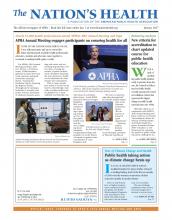Whether it was a Boston-born transgender patient or a Ugandan working in domestic servitude, APHA member Hanni Stoklosa, MD, MPH, has seen a variety of patients who were victims of sex or labor trafficking come through her emergency room.
Stoklosa, an emergency medicine physician at Boston’s Brigham and Women’s Hospital, and many others across the U.S. are working on creating public health responses to address their health needs, some which were outlined in a Nov. 1 session on the public health response to U.S. human trafficking at APHA’s 2016 Annual Meeting and Expo.
The physical and mental health effects of trafficking are numerous and include depression, chronic pelvic pain and post-traumatic stress disorder. Stoklosa, who also serves as executive director of Health Education Advocacy Linkage Trafficking, said health professionals from places such as the Boston Medical Center and Brigham and Women’s Hospital in Boston spent more than a year working together to develop a framework for how health care workers should best respond to the continued physical and mental health needs of trafficking victims.
At Boston Medical Center, staff at the center’s Project Alcohol and Substance Abuse Services Education and Referral to Treatment used the framework to target trafficking victims struggling with substance use and addiction issues. Over an eight-month period, the project identified 71 people ages 13 to 40. Most were female and most were sex trafficking victims, though one person was a labor trafficking victim, Stoklosa said.
One of the challenges in caring for trafficking victims is a lack of capacity, be it a lack of available hospital staff or a gap in places, such as shelters that can adequately address victims’ needs.
“If I have an adult male labor trafficking victim, it’s hard to find a place for him to be sheltered,” Stoklosa said. “Those are the realities of what we’re experiencing. It’s a call to arms. We need to increase the resources for the patients out there in these communities.”
In Miami, Project Trafficking Healthcare Resources and Interdisciplinary Victim Services and Education is tackling challenges to accessing care by creating an outpatient clinic based on the patient-centered medical home model. This means patients can go to one place to get access to a dedicated primary care physician as well as specialists such as obstetrician-gynecologists and psychiatrists who can deal with mental health crises.
Patients are also assigned navigators who serve as medical case managers and are “intimately connected” with their care through text and phone. While the clinic is open Monday through Friday, patients also have 24-hour access to clinic staff, said APHA member Joshua George, who is part of Project THRIVE and a medical student at the University of Miami Miller School of Medicine. As of Nov. 1, the clinic had seen 20 patients, 90 percent of whom were victims of sex trafficking. Two-thirds were U.S. citizens, he told session attendees.
Clinic staff is also trained on sensitivity and how to pick up on verbal and nonverbal cues from patients, thanks to a student-created video tutorial. The video explains trauma-informed care and depicts a dramatization of an interview between a health professional and trafficking victim, George said.
“Traditional ways in which we deliver care need to be modified,” George said. “We’re still figuring that out and what’s best for people that come. We see they’re very strong and we’re still learning what language to use and the words. We’re getting feedback from our survivors on doing that appropriately.”
A version of this story was published on APHA’s Annual Meeting Blog.
- Copyright The Nation’s Health, American Public Health Association









